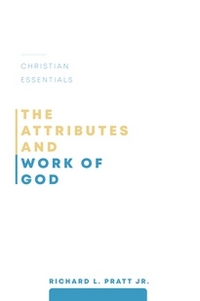 The Attributes and Work of God
The Attributes and Work of God
DETAILS: Series: Christian Essentials Publisher: P & R Publishing Publication Date: April 27, 2022 Format: Paperback Length: 184 pg. Read Date: July 31, 2022

What’s The Attributes and Work of God About?
This is a basic and broad introduction to Theology Proper—who God is, what He does, communicable and incommunicable attributes, the Trinity, etc. It’s adapted from curriculum using language that’s easy to translate—particularly into languages that don’t have a well-developed theological vocabulary—so the English is kept basic, too. There’s almost no academic or technical theological language used, and those that are used are well defined.
The chapters are short (most around ten pages, two are longer than fifteen) and well-organized. Each contains a handful of side-bars consisting of a paragraph or two with the contents of interviews with pastors and theologians on the topic under discussion. These interviews were with people from a variety of theological perspectives helping broaden the text written by a Reformed professor.
A Couple of Issues
It’s difficult, perhaps impossible, writing at the level Pratt is here and for the audience he has in mind to get too detailed on difficult subjects—that’s a given, and I wouldn’t expect that to change. Still, I found the way that subordinationism was covered because there’s a lot of good and a lot of sloppy material being put out about it right now. People at all levels need to be given the tools to look for the good.
Secondly, I was underwhelmed with the sections on foreknowledge, predestination, and election. This again is part of the design of the book—Pratt isn’t writing only for those in the Reformed/Reformed-ish camp, so he attempted to write something on these topics that can appeal to/apply to Reformed and broad-Evangelicals. I don’t think it’s possible to satisfy all corners of this discussion, and Pratt demonstrates it in the disappointing pages on the ideas.
So, what did I think about The Attributes and Work of God?
My problems are in the closing pages of the book—until that point, I was very satisfied. People wanting a broad curriculum to cover the basics in a High School/young College-age Sunday School class or Bible Study would benefit from this—especially if the instructor can augment the material in the subordination/predestination sections.
This was an incredibly easy, but informative, read. The discussion questions and “For Further Study” resource lists at the end of each chapter are stronger than many similar examples that I’ve run across lately.
I’d hoped for something a bit deeper, a bit more thorough. But once I saw—and it took almost no time to register that—that this isn’t at all the aim of this book, I was able to adjust and ended up really enjoying this. I’ll gladly recommend this to someone looking for this level/approach and am looking forward to reading the other entries in this series.

This post contains an affiliate link. If you purchase from it, I will get a small commission at no additional cost to you. As always, the opinions expressed are my own.
![]()


